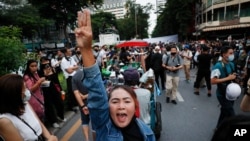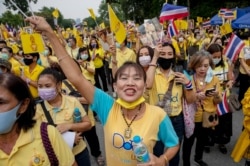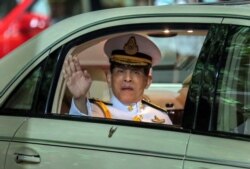Former Thai Prime Minister Anand Panyarachun, an internationally respected figure, has watched pro-democracy street protests roil Bangkok this summer. He finds himself agreeing with some of the movement’s key demands and believes there is room for reconciliation.
The protesters want “resign, rewrite, reform,” or the resignation of Prime Minister Prayuth Chan-ocha, the rewriting of Thailand’s constitution so it is more democratic and inclusive, and the reform of the monarchy. They also want the release of activists who have been arrested.
While pointing out that he was not in a position to respond to the call for Prayuth’s resignation, Anand said of the protesters’ demands, only the call to reform the monarchy gives him pause.
“It’s of national significance, but in my view, it is not something that needs to get done immediately,” he told VOA Thai. “I think what they said has gone overboard.”
While his past as a military-appointed prime minister draws criticism, Anand’s position and persona of elder statesman leads Thais to pay attention to his observations.
In 1991, military leaders who had staged a coup selected Anand to be prime minister. After an election, a former army chief accepted an invitation by coalition parties to become prime minister. The move triggered a huge protest that was met with a bloody crackdown, the “Black May” massacre in May 1992. Weeks later, Anand was appointed to lead the country again.
Since then, when Thailand faces a crisis, many turn to him as the voice of reason. Political leaders from opposing parties seek his advice.
That Anand, the domestic peacemaker, is even mentioning criticism of the monarchy speaks to the systemic changes the protesters want. For decades, Thailand’s harsh lèse majesté law, which carries the threat of up to 15 years in prison for criticizing the crown, has been used by authorities to stifle dissent.
The protesters, on the streets by the thousands since mid-July, now defy that law by speaking out against King Maha Vajiralongkorn. They are challenging a system that empowers a ruling elite dominated by former and current military men close to the Royal Palace, now occupied occasionally by Vajiralongkorn, who spends most of his time in Germany.
Many Thais agree with the protesters. According to a poll released Oct. 25 by Suan Dusit University, based on online surveys of 5,738 people from Oct. 19 to Oct. 22, 62.33% are dissatisfied with Prayuth, a former general; 49.85% want greater democracy; 47.11% want the constitution amended; and 44.15% say the government is doing a bad job.
On Wednesday, after the close of a nonvoting special session of parliament called to defuse the tension surrounding a weeklong state of emergency in Bangkok, Prayuth said he would not step down.
“The ongoing political problems don’t stem only from me or from the government. This is our country, Thailand, and we all are Thai. I do not carry hatred toward anyone, even though some make accusations against me. I will hear them out and be patient because I am the prime minister.”
Anand, who helped draft Thailand's "Peoples' Constitution" of 1997, which was nullified nine years later in a coup, agrees with the protesters who want the current constitution rewritten because it gives the nonelected Senate too much power.
“At the onset, we should stop thinking that a constitution is an elixir that solves all the problems. It’s a form of legislation but it has higher importance than other laws … It’s written to stipulate what is prohibited. Although it’s written to preempt coups, I don’t believe a coup can be stopped.”
Anand said the current government should move to strip the “undemocratic” clout of the unelected 250-member Senate.
“The appointment of 250 senators raises skepticism,” he told VOA Thai. “It can be regarded as the most undemocratic” element of the constitution.
“There shouldn’t have been unelected senators, especially when they vote to select the prime minister,” Anand said. “This seriously runs counter to democratic principles and should be corrected most urgently.”
Anand told VOA Thai he questioned the effectiveness of the Oct. 26-27 special parliamentary session, saying the legislative body failed to address the pro-democracy movement’s demand for the drafting a new constitution.
After the session Prayuth said on Wednesday that he supported amending the constitution but cautioned this would take time. If constitutional changes included eliminating the Senate’s power to select a prime minister, he said “I don’t have any objection.”
Prayuth did not address the protesters’ demand to reform the monarchy even as Thais who support the institution have taken to the streets with counterprotests. Police say this could lead to violent clashes.
For Anand, the protesters’ call to curb Vajiralongkorn’s influence is asking for too much change too fast.
Vajiralongkorn, the world’s richest royal, with access to a fortune worth $30 billion to $40 billion, had an official coronation in May 2019, almost three years after the death of the beloved previous king, his father, Bhumibol Adulyadej. Vajiralongkorn’s ascent to the throne, coupled with his push to consolidate power in the palace, has managed to provoke the previously unmentionable — criticism of the monarchy.
In September, protesters installed a plaque in Bangkok’s royal district saying, “The people have expressed the intention that this country belongs to the people, and not the king.”
It disappeared within hours.
“If you want to succeed in working out anything in the democratic society, your agendas have to be convincing enough for the general public,” Anand said.
Which reforming the monarchy may not be. The Suan Dusit University poll asked respondents what message they wanted to send the protesters. A solid majority, 60.41%, said “Don’t overreach to insult the monarchy.”
On the same question, the top response, chosen by 73.31%, was “don’t be out of control and don’t be used as a political tool by any side.”
“If you pick something that you think is urgent but it doesn’t align well with how other people think, you won’t be able to persuade others to be your allies,” Anand said.
The Thai ambassador to the U.S. and Germany during the Cold War, Anand described today’s Thailand as locked in an ideological clash that can be resolved.
“The conflict in Thailand isn’t like what we see in the U.S. or in Europe, which are about religions and races. For Thailand, it’s about political ideology or the way of thinking about politics,” which means “agreements are more within reach.”
“Political activism isn’t about meeting 100% of the goal or accomplishing everything on every agenda. In politics, there is neither a complete victory, nor an absolute defeat,” he said.
“I think the prime minister will have to be on the same page [as the reformists]. If he disagrees with proposed changes, things won’t get implemented,” Anand said. “He is in the position of power, of duties, and has many tools at his disposal to make an action item move forward. … What he thinks and what he decides will matter significantly to the future of the country.”







